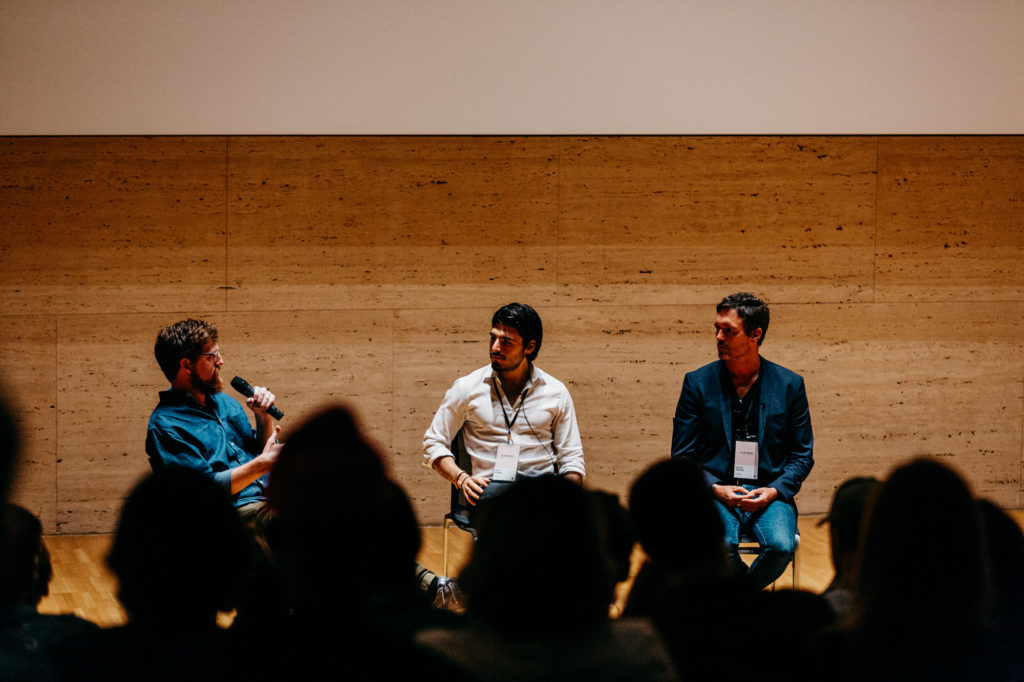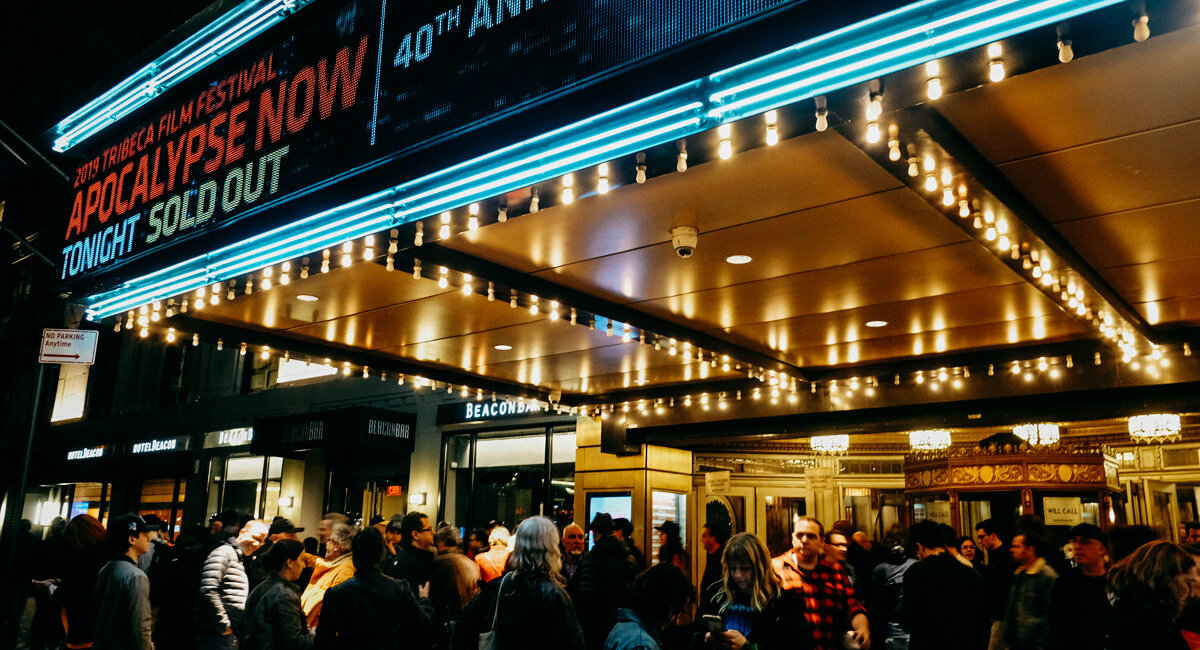In the film world, there’s no greater myth than a single “moment” where your career takes off. Any success story takes years of hard work and perseverance — however, that’s not to say there aren’t launching pads within those success stories. We recently talked about one version of that moment, but perhaps the most common for filmmakers is getting into film festivals.
As curators of taste and talent, programmers at these festivals have their finger on the pulse of the film industry. And with that power comes great responsibility, which programmer Drea Clark does not take lightly.
“Some people think my job sounds easy,” she told us. “But I encourage anyone to try and watch four films a day, constructively. It’s exhausting because you have people’s dreams in your hands. You have to take it seriously. There’s an urgency to it.”
Drea is a festival programmer for Sundance Film Festival, Geena Davis’ Bentonville Film Festival, and has previously worked for L.A. Film Festival and Slamdance. She’s behind breakout careers like Lynn Shelton (Sword of Trust), Jeremy Saulnier (Blue Ruin and Green Book), and Sean Baker (Tangerine and The Florida Project).
Drea watches more than 350 films every single year and plays an active role in whether they’re successful or not. She’s well aware of the uphill climb many filmmakers face to get accepted — she said Sundance receives around 14,000 submissions every year and only 100 actually get a premiere. So, in an effort to make that climb a little more friendly, we decided to chat with Drea to put together a rough guide for getting into film festivals.
There’s no secret formula, but there are things to look for and there’s no better person to deliver those insights than Drea. So, if the task of getting into film festivals has proved to be a daunting task, read on.

Choosing Your Film Festivals
Before working on your actual submission, you need to figure out exactly which festivals you’re going to submit to. After talking with Drea, it turns out your own selection process has a strategy unto itself.
1. Save your premiere
Your film only has one true premiere and it’s important for filmmakers to save it for the perfect moment, particularly the larger festivals if you can get into them. Discovery festivals, those like Sundance and Tribeca, for instance, will only consider films that haven’t premiered yet.
“The premiere of your film has a certain currency to it,” Drea says. “You only have one real premiere, your world premiere. So, the discovery festivals wouldn’t be taking your film seriously is you’ve already premiered at your hometown festival.”
So, start big with your selection process if you’re serious. Don’t test the waters at smaller festivals until you’ve already given the bigger names a shot, because you may be eliminating your chances before you even submit.
2. The more festivals, the better
Once you’ve figured out your premiere, now you’re off to the races. With the expansion of the festival circuit (there are more than 3,000 active festivals, currently) your options are growing every year. And Drea pointed out that just because they may not be iconic, they still put together great events — she mentioned Denver Film Festival, Seattle International Film Festival, and Sarasota Film Festival as events to consider.
“I think picking your premiere is key, but I also think at a certain point it’s not worth sitting on your film for a year because you have high hopes of playing in Park City,” Drea says. “I would encourage people to play as many festivals as possible across the country.”
For most indie releases, the festival circuit will be their only theatrical run, so by entering more film festivals, you’re giving your film even more legs—which means more audiences and a greater chance at potential distribution.
The premiere of your film has a certain currency to it. You only have one real premiere, your world premiere.
3. Know your festivals
Of course, there are niche festivals that cater to a particular genre, so it’s helpful to enter your film in events that cater to its genre. But, beyond the obvious, there are certain personalities and quirks that each festival takes on.
“It’s smart for people to familiarize themselves with festivals when you’re coming up with a strategy,” Drea says. “You can look at the past years and know what type of films they’re into.”
It helps to think regionally, too. Programmers like to select films that have a connection with the area it’s based in (we’ll get into this more later), so if you’re from New York, try out Tribeca, and so on.
4. Attend events you want to submit to
Beyond being enjoyable events, attending festivals you’d like to play at is a huge advantage. First, you can see the films that they tend to accept, but you can also make connections in real life, which can help with the submission process.
“Programmers generally moderate Q and As, so I’ve had people contact me a few years later and say, ‘I briefly met you at this screening and now I’m submitting my own film,’” Drea says. “The community level of it is something that programmers identify with and are looking for.”
Plus, directors and collaborators are more accessible at festivals, so you can begin to put together a network for that next project, too.

Submitting to Film Festivals
So, once you’ve come up with a festival strategy, it’s time to start submitting. Here are a few things Drea said you can use to your advantage to get a festival programmer’s attention.
1. Highlight personal threads
In many cases, especially in Film Freeway, which most festivals use for their submission process, there’s a space for a filmmaker statement. According to Drea, this space represents a huge potential for getting consideration.
“I think it’s smart to put things in that section that are specific to that festival’s interests,” Drea says. “If you have members of your team that are from the area or you producer went to school in the area, be sure to point that out, especially when you’re getting into regional and niche festivals.”
This can do two things — first, it creates a personal connection to your film and, second, it creates a potential built-in audience for the festival, which programmers are always looking for.
2. Give your film a hook
In many ways, festival programmers are curating the film industry. They’re looking for new, interesting stories to present to the world because it reflects positively on the craft and on the film festival itself.
“Festival programmers are always looking for things that stand out. So, if your film has a unique angle, be sure to point it out, something like a story being written by a Native woman or even something behind the scenes that sets it apart,” Drea says. “We’re always looking for something that will differentiate the film beyond just the film itself.”
In short, programmers are always looking for great stories, so be sure to let them know what makes your film unique. It helps them to promote their festival and gives them ways to promote your film as well.
We’re always looking for something that will differentiate the film beyond just the film itself.
3. Seek out connections
For most festivals, there’s an initial round of vetting that many of the assistant programmers will have their hands on. This means that many of the high-level programmers who’ll be actually making the final selections may not see your submission materials. This is where it’s helpful to take a note from the job application process and hunt down some actual emails.
“If you’re able to find an email address for someone on the programming team, send them a very friendly note that maybe has the same information as the note in your original statement,” Drea says. “I would send it to whatever random programming email you can find. For me, I’ll think, ‘This is good to know. I may seek this one out.’”
Of course, you may never hear back — and be sure you don’t inundate the programmer’s inbox, but every little bit helps. And it could mean the difference between getting into a film festival or getting a rejection letter.
4. Give your film the time it needs
This is possibly the most important point that Drea brought up. It’s critical to ask yourself this question before hitting that ‘submit’ button: Is my film ready for this festival?
“I think people are often like, ‘This is my chance. I’ve got to do this now,’ Drea says. “There’s something to be said for taking advantage of the moment, but I’ve seen so many films and said, ‘If they had done table reads they would’ve figured out that this doesn’t make any sense.’ For a lot of first-timers, I’ll wish they’d spent more time developing their film or their ideas.”
It’s a hard thing to admit, but the ultimate goal isn’t about getting into film festivals. It’s about making great films — getting into film festivals is just a byproduct of great films. So, take a moment to ask yourself tough questions, get honest feedback, and decide if this truly is your moment. If not, make the adjustments necessary to get it closer and submit next year. Those festivals aren’t going anywhere.





